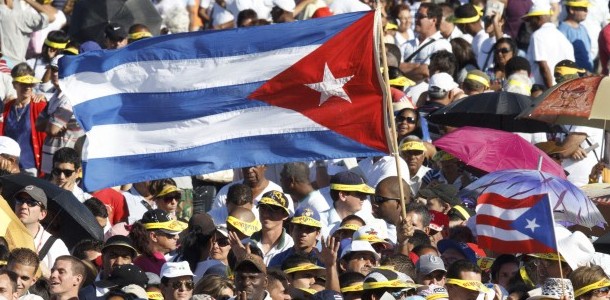The fruits of a papal visit are often not noticeable until after the banners and altars have come down. In Cuba it didn't take long to see the gifts of the papal visit.
Catholic News Service reported this week on the impact the Pope’s overnight stay in El Cobre. The preparations alone meant that infrastructure such as roads and buildings were repaired and improved to welcome the illustrious guest, much to the delight of residents who has been waiting a long time for such repairs.
The pope’s visit to El Cobre also brought Cubans – both Catholics and non Catholics- together under the banner of the Virgin of Charity or “La Caridad” as she is known. Although Santeria and other Christian denominations have a presence in El Cobre, the one thing that unites them all is a devotion to La Caridad. Pope Benedict repeatedly called Cubans to put aside their differences of belief, race, skin colour, and origin to work for the good of all Cubans and the chance at a better future.
The Holy Father repeated that call to the Cuban government during his Mass in Havana’s Plaza de la Revolución on March 28 saying, “I wish to encourage the country’s Government authorities to strengthen what has already been achieved and advance along the path of genuine service to the true good of Cuban as a whole."
The plaza holds an estimated 600,000 people and it was about two-thirds full when Mass started. Many of those were Catholics, participating in the first papal mass on Cuban soil in 14 years. However, many were not Catholic. One woman explained that the government had encouraged all Cubans to attend the mass, spreading the word through state-controlled media. One woman saying the move sent mixed messages given that the communist island nation was officially atheist until not long ago.
Whatever the intention, the fact remains that the previously atheist nation gave it's citizens two days off and strong encouragement to attend the papal mass, showing an unprecedented openness to the Church.
During the same homily in Havana, Pope Benedict reiterated the need for religious freedom, making it clear the church is not a threat. All the church wants to share is “Christ, our hope and glory” but in order to do so the church must “count on basic religious freedom, which consists in her being able to proclaim and celebrate her faith also in public,” he said.
Meeting with Cuban president Raúl Castro on March 27, Pope Benedict made a concrete request that would move the country further in that direction. He asked Raúl Castro to make Good Friday a public holiday. When JPII visited Cuba in 1998 he asked Fidel Castro to make Christmas a public holiday. The elder Castro obliged and that year, for the first time in about 30 years Cubans had a day off on December 25. If the younger Castro grants the Pope's request this would be another important move towards freedom of religion for Cubans.
Before leaving Cuba, Pope Benedict had one last meeting with the Island's most famous resident: Fidel Castro. The former president is now 85 years old, and far from the robust military leader the world saw greeting John Paul II in 1998.
In his 30 minutes with the pope, Fidel told the pope he followed the entire visit on television and asked him about the changes to the liturgy after the Second Vatican Council. The Castro brothers were raised Catholic and attended Jesuit runs schools in Havana. The last time Fidel and Raúl would have attended Mass, the liturgy looked very different.
The officially atheist Fidel Castro also thanked Pope Benedict for the beatifications of Mother Teresa and John Paul II, and then the two leaders discussed the problems of mankind from a "religious, scientific, and cultural" point of view. He then asked the Holy Father to send him a book to help him reflect.
As Pope Benedict said in his homilies throughout the trip, in order to change those things around us that are unjust, we first need to change our hearts. If Cuba is to change, open to greater religious freedom, it follows that the first change needs to be the hearts and minds of it's leaders. Although Fidel Castro may have given the reigns of power to his younger brother, he is still a presence in Cuban government. What impact, then, will Fidel's apparent openness to the deeper issues of mankind have on the Cuban nation? Perhaps this 30-minute meeting will bear the most fruit of all Pope Benedict's voyage.
-
Photo credit: CNS photo 
 Aline Haddad
Aline Haddad Salt + Light Media
Salt + Light Media Fr. Edmund Lo, SJ
Fr. Edmund Lo, SJ Julian Paparella
Julian Paparella Pope Francis
Pope Francis












